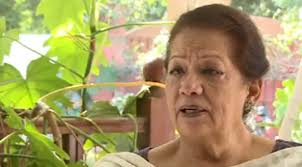
(Credit: thenews.com.pk)
The criticism we offered was harsh at times. She took it with great poise and tried her best to answer the questions raised against the party, its politics and the choices made by her leader. She was receptive, gentle and accepting – qualities rarely found in PTI neo-converts. They usually neither take any criticism in good stride nor try to respond to your comments logically. They counter you with hate mails, write against you and snub you privately or publicly. Zahra Shahid Hussain was different – an elderly, mature, self-assured and polite woman. Her cold-blooded murder outside her residence in Karachi reflects the barbarity of the perpetrators and our growing insensitivity as a people towards such gruesome acts of violence. My heart goes out to her family and friends. May she rest in peace.
While the PTI leadership in Karachi was a little more cautious and asked for immediate investigation and demanded the killers be arrested, Imran Khan was swift in apportioning blame on the MQM chief Altaf Hussain. His justification was Hussain’s earlier threats to the PTI’s demonstrators who complained of rigging and asked for a fresh round of balloting in some polling stations in Karachi. Khan’s statement came on the eve of the re-election on a select number of polling stations in NA-250, the constituency where the polling process was challenged by his party. The MQM had already rejected the ECP’s decision and boycotted the re-polling while demanding that it should be done across the constituency. The PPP and the JI had also boycotted the process for different reasons.
The MQM leader was incensed after he was blamed for being responsible for Zahra’s murder. He was also unhappy with the local MQM leadership for letting that happen. As a consequence, the workers of the party roughed up the local leaders. The party then decided to hold protest demonstrations against Khan and the PTI. Tensions have escalated in Karachi and the two parties are at daggers drawn. The MQM says that the protests will be peaceful in nature. However, the politics of Karachi tells a different story if you take stock of what has happened on the streets and in the neighbourhoods of the city over the past 25 years. Since he is also a British citizen, British authorities had already received thousands of complaints about Altaf Hussain’s incitement to violence in a speech made just after the elections – even before the murder took place.
In fairness, no one can be charged of a crime unless proper investigation is carried out. However, there are lessons to be learnt by both the MQM and the PTI from the tragic murder of Zahra Shahid Hussain. The MQM is still perceived to be a party that takes to violence if its wish and will are not followed by all concerned. No doubt it has a popular base but the realisation has to come sooner than later that it is increasingly impossible to coerce the electorate, influence the electoral process by force or keep getting the number of seats that defy the changes that have taken place over the years in both demography and political opinion in Karachi and Hyderabad.
On top of that, the MQM chief makes indefensible statements from time to time and its second-tier leadership keeps busy for weeks in contextualising and clarifying what has been said. If there are no good or bad Taliban, there is no good or bad violence either. If violence in the name of faith or sect has to be rejected, violence in the name of ethnicity or political difference cannot be accepted either – even for short-term ideological or political gains.
Zahra Shahid Hussain could have been killed by a reckless criminal or any third force but the MQM has to reflect on why it has always been blamed for such acts by its political adversaries. The party has so much ammunition in stock and there is much circumstantial evidence from the past to support these assertions. The liberal, plural and inclusive politics of the MQM and the initiatives it has taken to serve its constituents suffer a huge setback by its political tactics rooted in the late 1980s and 1990s. It is time a party as big and influential as the MQM comes of age. It is time for its leadership to realise that their clout increases across Pakistan if their image changes. Their image changes if they change their old tactics.
For the PTI, the death of one of their veteran leaders, someone who believed in the party from day one and did not opt for it after being rejected by other political forces, or after the October 2011 public meeting in Lahore, is a great loss. She is the first victim of violence from among the PTI leadership. It is time that the party leadership, its workers and supporters understand what it means to be hit by death and violence.
For instance, in case of the ANP, rather than blaming the victims and holding them responsible for their own suffering, the PTI rank and file needs to realise what happened to Bashir Ahmed Bilour, Mian Iftikhar Hussain’s son and more than 700 party leaders and workers who were killed in the last five years, including more than 100 during the election campaign and on election day. Likewise, when Ali Haider Gilani, the former PPP prime minister’s son, was kidnapped and his two aides shot down in broad daylight just two days before the general elections, the response from PTI’s supporters on social media was callous, calling the entire incident a political stunt.
When Imran Khan said – before the elections – that militants should not kill political workers and bomb political rallies but wait for the PTI tsunami to come and sweep away the political forces they dislike, imagine how an ordinary worker belonging to the ANP or the PPP would have felt. If he had let out the statesman in him, Khan would have rather clearly said that all parties must get a level playing field and no party should be threatened and kept out of the campaigning race. Like the MQM condemns faith-based and sectarian oppression and persecution but does not shun its own coercive methods, the PTI has come down hard on the MQM while being soft and apologetic to the TTP.
Violence – religious or political, in any form or for any reason – has to be condemned. Violence begets violence and spares no one in the end. Those who think they can be saved live in a fool’s paradise. Here, I remember the famous lines of Martin Niemoller, the anti-Nazi German pastor and theologian:
“First they came for the communists/and I didn’t speak out because I wasn’t a communist/Then they came for the socialists/and I didn’t speak out because I wasn’t a socialist/Then they came for the trade unionists/and I didn’t speak out because I wasn’t a trade unionist/Then they came for the Jews/and I didn’t speak out because I wasn’t a Jew/Then they came for the Catholics/and I didn’t speak out because I wasn’t a Catholic/Then they came for me/and there was no one left to speak for me.”
Email: harris.khalique@gmail.com

